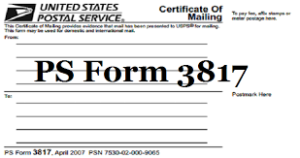Appellate Court Invalidates Substituted Service Under CCP 415.20(c) at a Commercial Mail Receiving Agency
By Tony Klein, © 2022
On October 15, 2021, the California Court of Appeal (2d Appellate District (LA)) issued a ruling in Kremerman v. White 71 Cal.App.5th 358 (2021), invalidating a service based upon declarations and a proof of service that inaccurately described service at a commercial mail receiving agency (CMRA).
The problem, illuminated in the Kremerman decision, invalidated the service because, inter alia, the service did not strictly comply with the statute.
The process server retained in the case made several attempts to personally serve the defendant Angela White (aka Blac Chyna, hereinafter referred to as White) with a breach of contract and negligence lawsuit at several addresses – one where the plaintiff knew she vacated, her new address where she moved, and another at a CMRA where she received mail.
After attempting service and stakeouts at all these addresses, the process server left the summons and complaint at the CMRA and mailed a copy there.
The trial court ordered that the defendant was in default and entered a default judgment. White filed a motion claiming that she was never effectively served which the court denied. The plaintiff then levied White’s bank account and White appealed.
The appellate court reviewed the record and ultimately reversed the trial court’s denial of White’s motion to set aside the judgment and remanded the case with instructions to the trial court to vacate the entry of default and the default judgment and to set aside the garnishment order issued to execute the judgment.
The appellate court found several deficiencies with the service. The process server’s declaration erroneously referenced that he was serving an unlawful detainer action, when in fact the case was for breach of contract and negligence. The server attempted service at the White’s vacated address, her new address, and performed unsuccessful stakeout attempts at both locations, and ultimately sub-served the lawsuit at a CMRA, her mailing address without first establishing due diligence there. The process server provided a proof of service stating that the documents were left there at 11:57 PM with a “competent member of the household”, and then mailed the subserved copy to “the authorized employee at Postal Annex.”
The CMRA employee who accepted service provided a declaration that she received the documents and, within 48 hours of receipt, placed a copy in the defendant’s box, and mailed a copy to the defendant’s mailing address at the CMRA, not her actual address on file, 20 days later.
The court discussed the distinction between a void and voidable judgment and agreed with White’s assertion that the proof of service and declarations describing it were invalid and did not comply with the statutory requirements. The proof of service was deemed “invalid on its face”, based upon the court record, and no further extrinsic evidence was necessary to make that determination. The trial court, therefore, lacked jurisdiction over the Defendant to adjudicate the action and exceeded its authority to enter the default and default judgment.
Issue #1: The process server incorrectly described the documents being served on the diligence declaration, and attempted service at a home address known by the plaintiff already vacated by White months earlier; therefore, none of those attempts should count towards due diligence.
Issue #2: The process server checked the incorrect box [box 5(b)(2)] on the proof of service stating service was effected at the “dwelling house or usual place of abode” of the defendant by leaving with “a competent member of the household”; whereas, the server should have instead checked the box for “usual mailing address” [box 5(b)(3)]. Also, the server mailed the documents to the CMRA employee, not to the Defendant.
Issue #3: CCP §415.20(c) has the statutory requirement that the CMRA address must be the only address reasonably known to the Plaintiff; whereas, here, the Plaintiff knew the Defendant’s current home address.
Issue #4: Because there was no diligence established prior to service at the CMRA, based upon the server’s defective due diligence declarations (see Issue #1 above), the only option for a valid service would fall under CCP §415.20(c) rather than §415.20(b); therefore, the strict language of subsection (c) has become problematic. Had the server properly documented the several due diligence attempts at the known home address of the Defendant, the Plaintiff could have possibly supported valid service under CCP §415.20(b) – notwithstanding the server’s assertion that service was made there 3 minutes before midnight.
Amendment to CCP 415.20
The recent amendment to CCP sec. 415.20 and adding subsection (c) conflated B&P Code section 17538.5(d) into a service of process statute with the phrase “in the manner described in” that section. That B&P section is not a service of process law. It is a law that limits the liability of a CMRA when receiving service of process for the defendant.
Under B&P Code section 17538.5(d), the CMRA must:
1) make a copy and place one set of the documents in the defendant’s box within 48 hours; and
2) then, within 5 days of receipt of the service, enclose the second copy of the served documents in an envelope, put postage on it, go to a post office, stand in line, and mail it to the defendant at the last known address in the CMRA’s file; and
3) then purchase a Certificate of Mail from the post office for $1.65; and
4) then prepare an affidavit of service by mail with the Certificate of Mail attached and provide a copy to any requesting party or the court.
Then the CMRA is not liable to the defendant, and service is “deemed perfected” within 10 days after said mailing.
Under existing and recently amended CCP sec. 415.20(c), service is only valid if the CMRA does all of that. In other words, the process server is relying on a third person, the CMRA, to comply with B&P Code sec. 17538.5(d).
The defect in the service cannot be cured by the process server’s sub-service mailing to the address of the CMRA because the address for mailing under B&P Code sec. 17538.5(d) must be made by the CMRA to the last known address on file. That address is unknown to the server. As mentioned previously, the CMRA in this case did not mail the documents to White at her address on file, but instead, to her mailbox.
Service is valid when made at the defendant’s mailing address – any mailing address other than a U.S. Post Office box – under CCP sec. 415.20(b) after making a due diligent attempt to serve. The mailing to the defendant is complete 10 days after the date of service and mailing.
The process server “effects” service by delivery and mailing, and service deemed complete 10 days after the mailing. The CMRA “perfects” service by its mailing, and “(s)ervice of process upon the mail receiving service customer shall then be deemed perfected 10 days after the date of mailing.”
The Law.com legal dictionary defines perfected as “having completed all necessary legal steps to achieve a result, such as perfect title to property.”
Merriam-Webster defines “perfect” as follows:
…
1b: satisfying all requirements: ACCURATE …
1e: legally valid
The use of the word “perfect” creates ambiguity in the law. B&P Code sec 17538.5(d) is a limitation of liability statute. In this context, the CMRA is not liable when service is perfected. The “legal result” here is to specify the dates and all the legal steps the CMRA must take to limit its liability – not when service is deemed “effected”.
But when is service of process deemed “effected”? Is it ten days after the process server mails the sub-service copy, or when (or if) the CMRA mails a copy? How is the court able to determine when the defendant is in default? This apparent ambiguity still arises when the process server establishes due diligence and subserves the CMRA under CCP sec. 415.20(b) and mails a copy to the defendant.
The phrase in CCP sec. 415.20(c) “if the only address reasonably known for the person to be served is a private mailbox obtained through a commercial mail receiving agency” allows service to be made without due diligence either when the CMRA address is the only known address or due diligence has been made at any known alternative address. The phrase “[n]otwithstanding subdivision (b)…” in CCP sec. 415.20(c) requires it.
What this appellate decision illustrates is that the declarations and proof of service must be accurately prepared to reflect the service event. This service probably could have been defended if the declarations were accurate, although the server’s mailing should have been addressed to the defendant, not the CMRA. The focus on the CMRA’s failure to comply with B&P Code sec. 17538.5, which of course is embedded and referenced in CCP 415.20(c), only piles on to the server’s improperly completed declarations.
Nevertheless, the decision addressed why the service was invalid for purpose of voiding the judgment. It did not address the issue to fix the date when service is deemed complete and will perpetuate the confusion when and if the CMRA does not strictly comply with B&P sec. 17538.5(d).
Since this is now a reported decision, it could provide an affirmative defense for defendants who are sub-served at a CMRA with or without due diligence. It could result in challenges to services made under CCP sec. 415.20(c) since it went into effect in 2018.
Special thanks to Gretchen Lichtenberger for her input
See related blog post here.


